“Russia is great, but there is nowhere to retreat — Moscow is behind!”
75 years ago, September 30 - October 2, 1941, Army Group Center launched an operation called the German Command Typhoon. The enemy surpassed our troops in men and technology by a half to two times and in the first days of the offensive broke through the defense of the Red Army.
On the night of October 2, the troops of the Eastern Front read out Hitler’s order: “Finally, a prerequisite was created for the last huge blow, which, before the onset of winter, should lead to the destruction of the enemy. All preparations, as far as possible for human effort, are already over. This time, systematically, step by step, preparations were under way to bring the enemy into a position in which we can now deal him a fatal blow. Today begins the last, big, decisive battle of this year. In a speech on the radio 3 in October, Hitler said that 48 hours ago on the Eastern Front began new operations of gigantic proportions. "The enemy has already been defeated and will never regain strength again," the Führer assured.
However, he miscalculated. The Russian army, despite the terrible losses, withstood the enemy’s powerful blows and only strengthened the resistance, the Soviet state did not fall apart, as it was expected in the West. By December, the Wehrmacht was drained of heavy fighting and could no longer advance. The typhoon has stalled. And on December 5, the Red Army launched a counteroffensive near Moscow, which led to the beginning of a strategic breakthrough in the Great War.
Western historiography diminishes the importance of the Battle of Moscow, linking the change in World War II with the victories of the American-British forces in Africa (Moroccan-Algerian operation, or Operation Torch) and in Sicily (Sicilian operation, or Operation Husky). At the same time, Western historians are looking for easy explanations of the defeat of the Wehrmacht near Moscow. They are justified by the harsh natural conditions of Russia, in particular the autumnal thaw and the exceptionally harsh winter, as well as poor communications. However, they forget that the Soviet troops acted in the same conditions that our troops also sank in the mud and froze. However, the Soviet fighters knew that it was impossible to retreat further, behind Moscow. Also, the commanders and privates of the Red Army, beaten and fought before in numerous "cauldrons", have already received a great deal of combat experience. As the saying goes: give two unbeaten for one beaten. On the other hand, the supreme Soviet command skillfully prepared new defensive lines, dragged down reserves, used the fact that Japan did not enter the war, redeploying part of the troops from the East. Thus, there is no doubt that the main reason for the failure of Operation Typhoon and the victories near Moscow was the increased military skill of the Red Army command, the mass heroism of ordinary soldiers and Soviet citizens in the rear, who did everything possible and impossible for the coming Great Victory. The Russian spirit, which until now cannot be understood in the West, allowed the Russian people to stand and win.
prehistory
Starting a war against the Soviet Union, Hitler announced that he would be in Moscow in two or three weeks after the start of the war. With this boastful statement, the Führer apparently wanted to emphasize that the Russian campaign would be as lightning as the previous military campaigns in Europe. However, the war in the East was different than in the West. It was a war of annihilation. Russian soldiers and commanders showed unparalleled resilience and heroism, which crossed all the plans of the German High Command.
During the summer campaign, the Red Army frustrated Berlin’s plans for a “blitzkrieg” in the East. The Wehrmacht suffered unexpectedly high losses, which have not yet been during the military campaigns in Western Europe. The battle for Smolensk (July 10 - September 10 1941) delayed the German attack on Moscow for the month 2. Also, part of the forces from the central strategic direction the Wehrmacht had to be pulled to the south, for the battle for Kiev and to the north - the battle for Leningrad. In September, the enemy was stopped in the Far North, near Leningrad, on the Svir and Volkhov rivers.
Thus, by the beginning of the autumn of 1941, the German army, due to serious losses and increased resistance of the Red Army, could not equally successfully develop an offensive in all strategic areas. In order to launch an offensive on Leningrad and achieve success in the Kiev area, the German command had to because of the lack of strategic reserves (hoped for a “blitzkrieg”, so there were no large reserves, the country and the economy were not fully transferred to the “war rails”) their flank strategic groupings at the expense of Army Group Center, which temporarily turned defensive.
However, the situation was still extremely difficult. The enemy stood at the encircled Leningrad, threatened Moscow, rushed to Kharkov, in the Donbass and the Crimea. Soviet troops did not have a solid and sustainable defense front. With the breakthroughs of the enemy of the Red Army, it was necessary to retreat into the interior of the country, detaining him on separate intermediate lines, creating defense around a number of cities. The Soviet Union has not yet completed the restructuring of the national economy on a war footing. The mass evacuation of millions of people, wealth and equipment of factories from the front areas to the rear continued, unprecedented in scope. Therefore, there was a shortage weaponsespecially modern, not enough ammunition. Reserves and reinforcements were less armed and trained than enemy troops. The enemy retained a strategic initiative, the Wehrmacht still had powerful strike capabilities, first-class armored formations and the Air Force.
On the eve of the great battle. Typhoon Plan
The fall of the attack rate, the stubborn resistance of the enemy and the huge losses that the Wehrmacht suffered on the Russian front, forced the German high command to recognize that the Red Army was a strong enemy and that the scornful attitude towards the Soviet army and the USSR, which prevailed in Germany on the eve of the war, was deeply mistaken. However, the Germans and in the autumn of 1941, after three months of war, still believed in their complete superiority, underestimated the strength and capabilities of the Red Army, the potential of the Soviet economy and the fighting spirit of the Soviet people. The military and political leadership of the Third Reich did not abandon the plan to crush the USSR before the beginning of the winter 1941-1942. Hitler believed that the Russians were already at the last gasp and needed only to finish them off. Many German generals also adhered to this point of view. They believed that one strong blow to the Red Army would be enough for the Soviet Union to collapse.
The ultimate goal of the planned operations was to take Moscow, Leningrad, Kharkov, Donbass and other leading industrial centers of the European part of the USSR before the beginning of winter. The success of the Wehrmacht in the Ukraine-Ukraine once again created favorable conditions for the offensive of the Army Group "Center". The operations of the Soviet capital to seize the German command gave paramount importance. It was believed that after the seizure of the political center of the USSR, the most important hub of strategic communications and the industrial center, Russia would no longer be able to put up former resistance. The fall of Moscow, after the loss of the other economic and political centers of the Union (Kiev, Minsk, Smolensk, etc.), according to the Hitlerites, should lead to political, economic and military disorganization of the USSR and the collapse of the Red Empire.
Therefore, Hitler decided to resume the offensive on Moscow. Directive OKV (Supreme High Command of the Wehrmacht) No. 6, signed by the Fuhrer on September 1941, 35, said that prerequisites had been created for a decisive operation in the western direction and an attack on Moscow. In this directive, Army Group “Sever” proposed, together with the Finnish army, to encircle Soviet troops in the Leningrad region and not later than September 15 to release a significant part of the mobile formations and aviation to transfer them to Army Group Center. The Germans planned to carry out a double encirclement of Leningrad: by blowing through the Neva to the north to create an inner circle of encirclement, and then offensive from the Volkhov River to the north-east to join Finnish troops on the Svir River. At the same time, it was planned to launch a major air attack on Leningrad.
Army Group Center was instructed not later than the end of September to launch a decisive offensive in the Moscow direction, using powerful mobile forces concentrated on the flanks of the group, to encircle and destroy Soviet troops located east of Smolensk, and to open the way for a further attack on Moscow in a wide strip between Oka and the upper reaches of the Volga. Army Group South ”at that time was to complete the operation launched against the Soviet Southwestern Front. Then planned the 2nd field army and the 2nd tank to return the group to Army Group Center, and to conduct an offensive on the Donbass, in the Crimea and further on to the Caucasus with the troops of the right flank. Thus, in the planned strategic offensive, the main place was given to the capture of Moscow. The fall of Moscow was to mark a complete victory over the Soviet Union.
The attack on Moscow was prepared for about a month. The specific plan of the attack on Moscow bore the code name Typhoon. It envisaged a complex of operations: by striking three powerful groups from the Dukhovshchina, Roslavl and Shostka areas (3-I, 4-I and 2-I tank groups) to dismember the opposing forces of the Western, Reserve and Bryansk fronts, surround their main forces and destroy, and then deploy a frontal attack on the Soviet capital. The tank and motorized formations were tasked to reach the Soviet capital from the north and south. Army Group Commander "Center Field Marshal von Bock September 16 ordered to proceed with the preparation of the operation" Typhoon. "
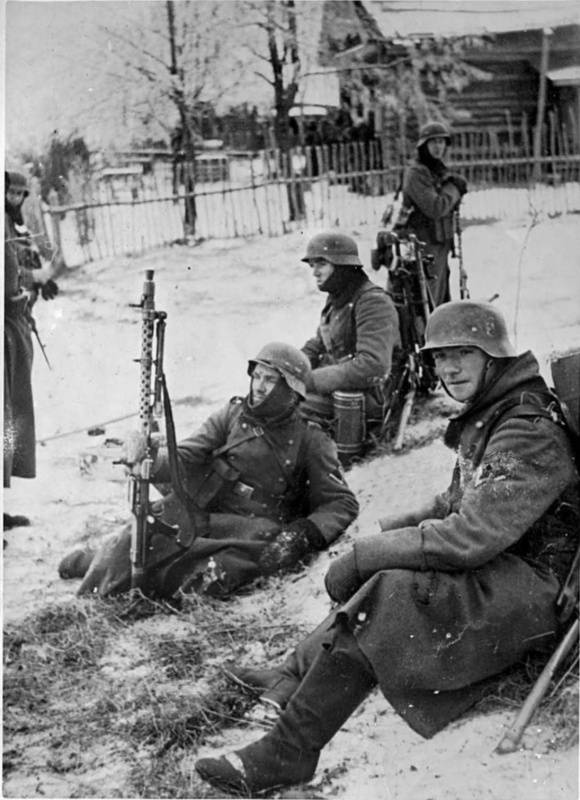
German soldiers on a halt during the battle for Moscow
Forces of the parties. Germany
To attack Moscow, Army Group Center was strengthened by regrouping troops from other directions. The 2-th army of von Weichs and the 2-I tank group of Guderian, the corps of the 3-th tank group from the north-west direction (from the Demyansk region) were returned to its structure from the south. In addition, from the Leningrad region near Smolensk, the 4 tank control group of Göpner was transferred, and several army corps from Army Group South were deployed to the south wing of the central sector of the front. Also in the army group were: Strauss 9-I, von Kluge's 4-I, Goth's 3-I tank group (from October 5 - Reinhard). From the air, the army group was supported by the 2 th air fleet of Field Marshal A. Kesselring (1320 aircraft).
In total, by the end of September, the Army Group Center had more than 1 million people (according to other data, about 1,9 million people), 1700 tanks and self-propelled guns, 14 thousand guns and mortars. There were 77 divisions, including 14 tank and 8 motorized. This was 40% of all infantry and 64% of all mobile units that were on the Russian front. By the beginning of the offensive, most of the troops were concentrated in three strike groups in the direction of the planned attacks.
The northern grouping (9-I field army and 3-I tank group) received an order to strike from the Dukhovshchina area in the direction of Bely - Sychevka. After the break-through of the Soviet defense, the motorized corps of the 3 tank group had to intercept the Rzhev-Vyazma and Vyazma-Moscow railways and reach Vyazma from the north and northeast.
The central grouping (4-I army and 4-I tank group) were to strike along the Roslavl-Moscow highway in the direction of Spask-Demensk-Yukhnov. Having broken through the defense of the Red Army, the German troops were to bypass Vyazma from the south and, interacting with the units of the 3 tank group, surround the Vyazma group of Soviet troops. On the inner flanks of the 9 and 4 armies between Yelnya and the Minsk-Moscow road, it was planned to separate the enemy with separate strikes with limited goals, mislead the Soviet command regarding the direction of the main attack of the Wehrmacht.
The southern strike force (the 2 Army and the 2 Panzer Group) ordered the 2 Army to break through the defense of the Bryansk Front on the Desna northwest of Bryansk and then launch an offensive in the direction of Sukhinichi, sweeping the forces of the Bryansk Front from the north, and 2- th tank group to strike from the region Shostka on the Eagle. At the same time, part of the 2 tank group, in cooperation with the 2 army, was to seize the Bryansk industrial region.
Especially great superiority of the army group "Center" was in the directions of the main attacks. For example, in the defense zone of the 19 and 30 of the Soviet armies, the Germans had an advantage in men — 3 times, tanks — 1,7, and guns and mortars — 3,8 times. In the defense zone of the 24 and 43 armies of the Reserve Front: in men in 3,2 times, in tanks - in 8,5, in guns and mortars - in 7 times. In the direction of Oryol, where the 13 Army and the operative group of General Yermakov defended, the Wehrmacht had superiority in manpower 2,6 times, in guns and mortars - 4,5 times. This allowed the Soviet forces to quickly penetrate and break through to the rear of the Red Army.
Soviet Union
The Soviet Supreme Command took steps to create a strong defense in the Moscow strategic direction. It was concentrated more than 40% of all forces of the Red Army, 35% of tanks and aircraft that fought between the Baltic and the Black Sea.
On the distant approaches to the capital, the forces of three fronts defended: the Western (I. S. Konev), the Reserve (S. M. Budyonny) and the Bryansk (A. I. Eremenko). The western front of the forces of six reinforced armies (22-I, 29-I, 30-I, 19-I, 16-I and 20-I) kept the defense in the strip from Lake Seliger to Yelni. The main forces of the Reserve Front (31-I, 32-I, 33-I and 49-I armies) occupied the defense in the second echelon, behind the Western front at the line of Ostashkov, Selizharovo, Olenino, Spas-Demyansk, Kirov. The 24-I and 43-I armies of the Reserve Front were located in the first echelon on the left flank of the Western Front in the strip from Yelnya to the village of Frolovka. The Bryansk Front, consisting of three armies (13, 50 and 3) and the task force, defended along the eastern bank of the Desna from Frolovka to Putivl.
The three fronts consisted of about 800 thousand people (according to other data - 1 million 250 thousand people), about 800 tanks, 6800 guns and mortars, 545 aircraft (according to other sources - more 1000 tanks, more 10,5 thousand guns and mortars). Total 96 divisions, 14 brigades and 2 fortified area. In addition, later on, the 21 militia division participated in the battle for Moscow with a total squadron of 200 thousand people, 14 reserve divisions with a total squadron of 120 thousand man, 6 guards divisions of the Airborne Forces, 9 divisions taken from Siberia. Also, additional tank units, air defense of Moscow as part of 3 air divisions and 368 long-range aviation bombers.
Simultaneously with the strengthening of the troops of the western strategic direction, the State Defense Committee (GKO) took extraordinary measures to create several defense lines in the rear of the Western Front, on the far and near approaches to Moscow, and to deploy the Reserve of the Main High Command. The troops of the Moscow Military District led to full combat readiness, took measures to form the defense system of the capital itself.
To prepare for the defense of Moscow in July-September, 1941 launched the construction of the Rzhev-Vyazma and Mozhaisk defense lines to a depth of 250 km. The works were carried out by military construction units with the help of residents of Moscow, Moscow, Smolensk, Tula and Kalinin regions. Excavation work was carried out mainly by civilians, mostly women. Thus, 300-400 thousand people participated in the construction of the Rzhev-Vyazma line every day. For two months, 2250 km of anti-tank ditches and escarpes were discovered here, around 1000 fortifications were built. The Rzhev-Vyazma line passed in 50-80 km from the front edge of the defense of the troops of the Western Front and was the rear defensive line of the Reserve Front. She served as a cover for distant approaches to Moscow on the Volokolamsk, Mozhaysk and Maloyaroslavets directions. At the Rzhev-Vyazma line, most of the national militia divisions defended.
Mozhaisk line of defense was erected in case of a breakthrough in the defense of the Reserve Front. Its basis was the Vyazemsky, Mozhaisk, Maloyaroslavetsky and Kaluga fortified areas. However, due to the enormous scale of work, the construction of defensive lines was delayed, and by the beginning of the German offensive against Moscow, only 40-60% had been completed.
The whole life of the Soviet capital was subordinated to the tasks of fighting the enemy. Particular attention was paid to air defense. Organized 13 thousand volunteer fire brigades. At the enterprises, in establishments, in educational institutions and houses houses were set up to fight fires. With the onset of darkness in Moscow, a complete blackout was introduced. On the outskirts of the city raised balloons air barriers. Air approaches to the capital were guarded by fighter aircraft and anti-aircraft artillery of the Moscow air defense zone. Already in July, it had 602 aircraft, 796 medium and 248 small-caliber guns, 336 anti-aircraft guns, 400 searchlight systems, and 600 aerial surveillance, warning and communication posts (OVNS). In Moscow, 12 volunteers formed divisions of the national militia.
Despite the fact that the western direction was constantly in the center of attention of the Soviet command, he was unable to detect in time the preparation of the Wehrmacht for the big offensive against Moscow and to decide in advance the enemy’s plan. Only at the end of September, the Soviet General Headquarters received information on the preparation of a large offensive on the capital. The headquarters immediately abandoned private offensive operations and guided the front command to a transition to stubborn defense. In directives to the fronts of September 27, the Headquarters ordered: to mobilize all the demining units of the fronts, armies and divisions to strengthen the defensive lines. At the same time ordered to prepare new defensive lines in the rear of the fronts. The command of the fronts was instructed to accumulate front-line and army reserves, to withdraw the most weakened divisions to the rear for replenishment and reinforcement. The front commanders warned the troops about the impending offensive of the enemy and pointed out the need for increased vigilance and alertness. However, the measures of the Stavka and the command of the fronts were late for all. The troops did not have time to strengthen the defense, to regroup the forces according to new plans, especially in those areas where the main attacks of the enemy were expected.
Thus, because of the higher combat class of the Wehrmacht, its technical and numerical superiority in the directions of the main attacks, the mistakes of the Soviet command, the German army was able to break through the Soviet defense in the Moscow direction. The Soviet troops had to compensate for all this with the qualities traditional for the Russian soldiers: the greatest perseverance and perseverance, fearlessness and unshakable will to win, mass heroism and readiness for self-sacrifice. This allowed the Soviet command to take measures to rectify the situation and defend the capital, grinding the Wehrmacht strike forces in the Battle for Moscow.
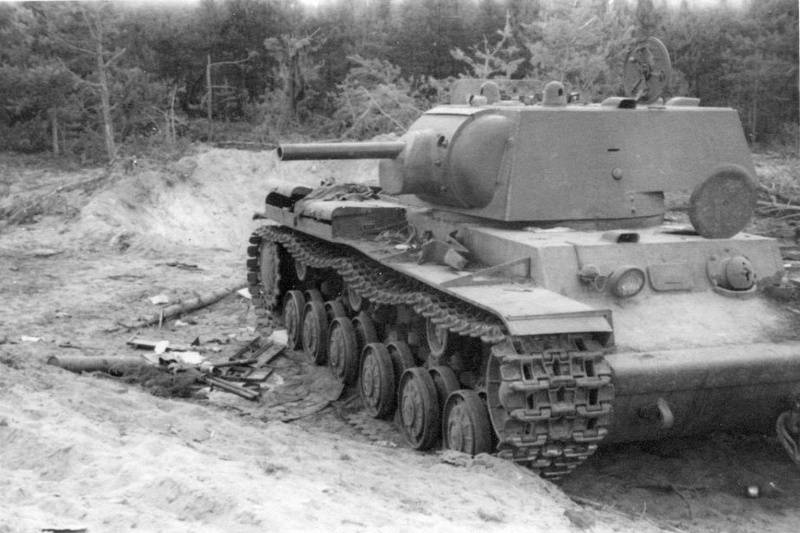
Soviet tank KV-1, abandoned in the area of Bryansk
To be continued ...
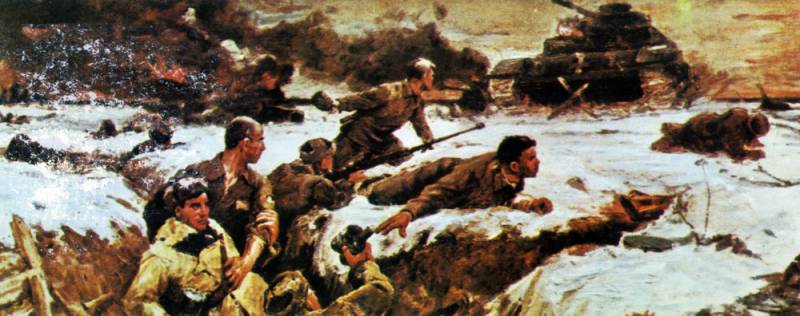
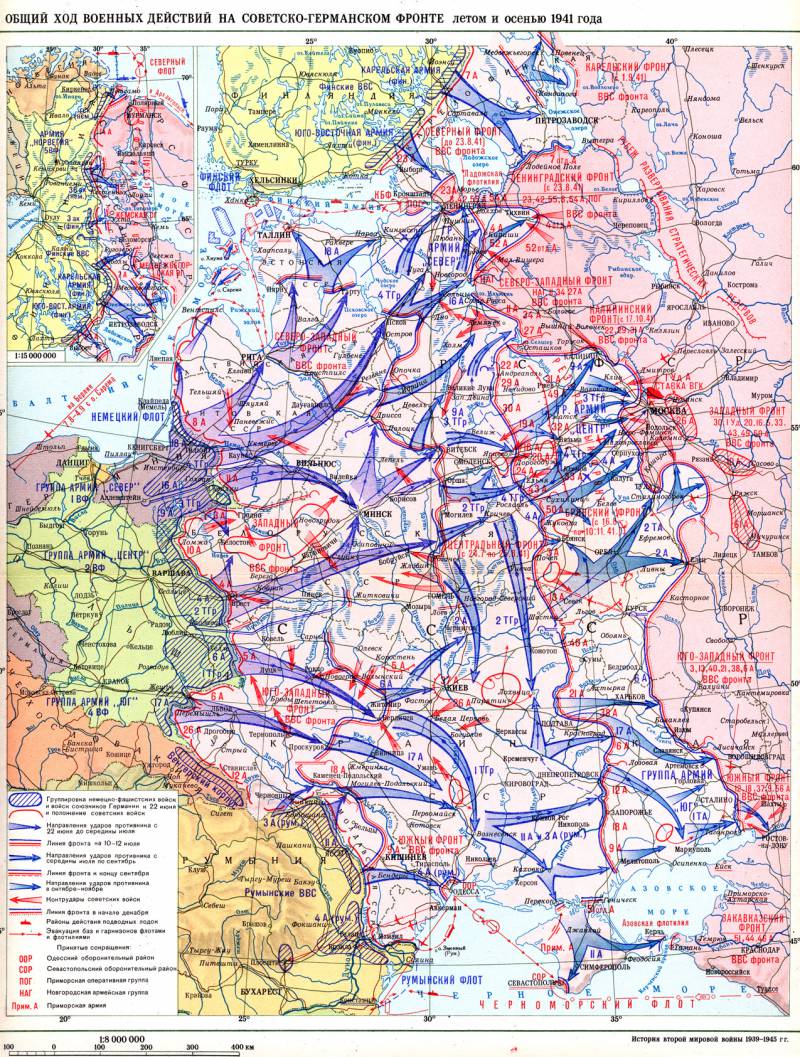
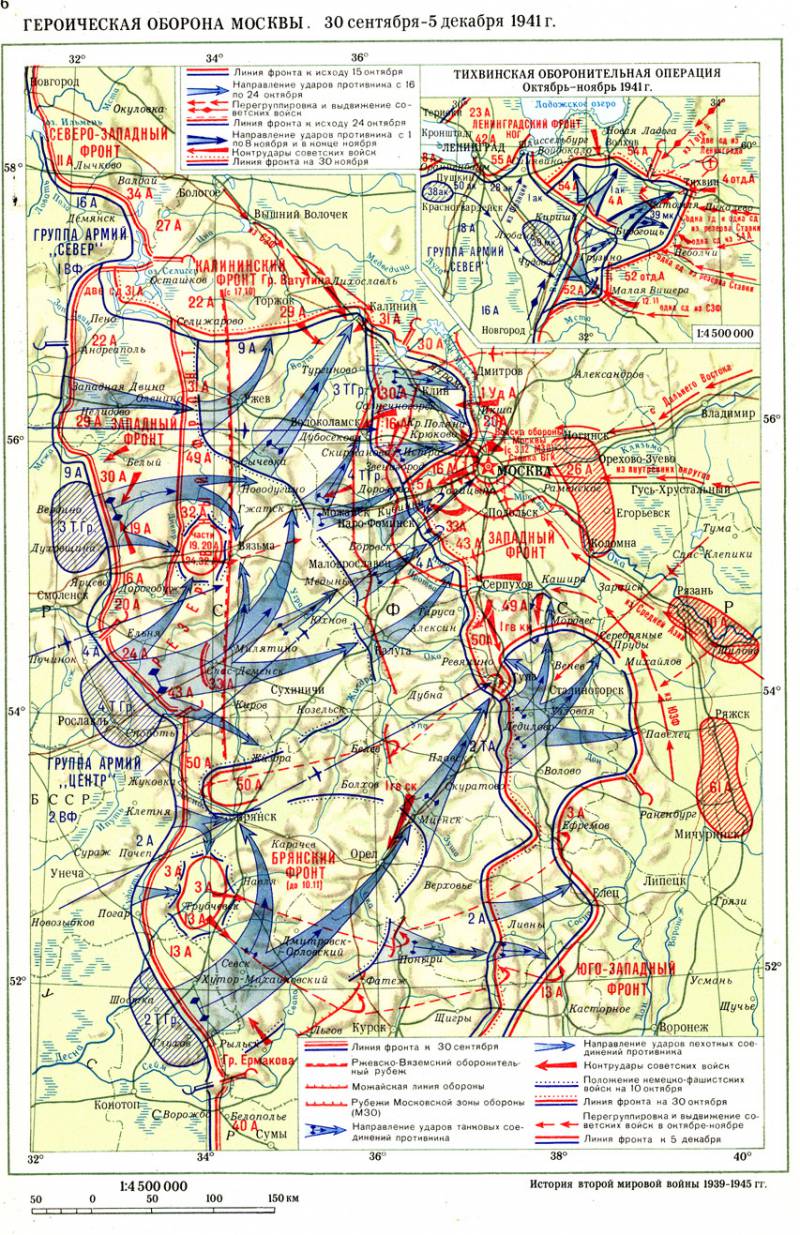
Information